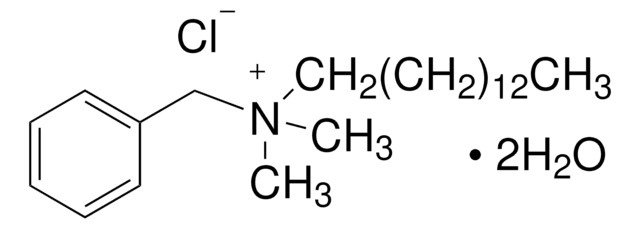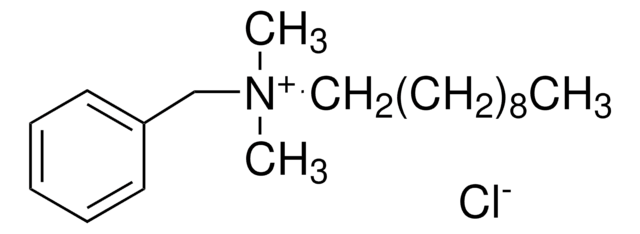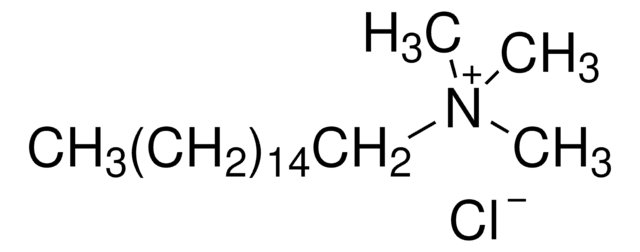B4136
Benzyl-dimethyl-hexadecylammoniumchlorid
cationic detergent
Synonym(e):
Benzylhexadecyldimethylammoniumchlorid, Cetalkoniumchlorid, Cetyldimethylbenzylammoniumchlorid
About This Item
Empfohlene Produkte
Qualitätsniveau
Form
powder
Mol-Gew.
396.09 g/mol
mp (Schmelzpunkt)
55-65 °C (lit.)
Lagertemp.
room temp
SMILES String
[Cl-].CCCCCCCCCCCCCCCC[N+](C)(C)Cc1ccccc1
InChI
1S/C25H46N.ClH/c1-4-5-6-7-8-9-10-11-12-13-14-15-16-20-23-26(2,3)24-25-21-18-17-19-22-25;/h17-19,21-22H,4-16,20,23-24H2,1-3H3;1H/q+1;/p-1
InChIKey
SXPWTBGAZSPLHA-UHFFFAOYSA-M
Suchen Sie nach ähnlichen Produkten? Aufrufen Leitfaden zum Produktvergleich
Allgemeine Beschreibung
Anwendung
Signalwort
Danger
H-Sätze
Gefahreneinstufungen
Acute Tox. 4 Oral - Aquatic Acute 1 - Aquatic Chronic 1 - Eye Dam. 1 - Skin Corr. 1B
Lagerklassenschlüssel
8A - Combustible corrosive hazardous materials
WGK
WGK 2
Flammpunkt (°F)
143.6 °F - Pensky-Martens closed cup
Flammpunkt (°C)
62 °C - Pensky-Martens closed cup
Persönliche Schutzausrüstung
Eyeshields, Faceshields, Gloves, type P3 (EN 143) respirator cartridges
Analysenzertifikate (COA)
Suchen Sie nach Analysenzertifikate (COA), indem Sie die Lot-/Chargennummer des Produkts eingeben. Lot- und Chargennummern sind auf dem Produktetikett hinter den Wörtern ‘Lot’ oder ‘Batch’ (Lot oder Charge) zu finden.
Besitzen Sie dieses Produkt bereits?
In der Dokumentenbibliothek finden Sie die Dokumentation zu den Produkten, die Sie kürzlich erworben haben.
Kunden haben sich ebenfalls angesehen
Unser Team von Wissenschaftlern verfügt über Erfahrung in allen Forschungsbereichen einschließlich Life Science, Materialwissenschaften, chemischer Synthese, Chromatographie, Analytik und vielen mehr..
Setzen Sie sich mit dem technischen Dienst in Verbindung.










